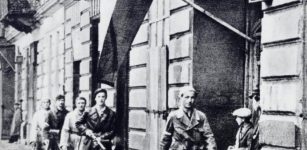On This Day In History: Admiral John Byng Charged With ‘Failing To Do His Utmost’ – Executed – On Mar 14, 1757
MessageToEagle.com – On March 14, 1757, John Byng, an admiral of the Royal Navy was executed by firing squad for neglect of duty.
Byng was born on October 29, 1704, in Southill, Bedfordshire, the son of a prominent Royal Navy admiral. He entered the Royal Navy in 1718, and by 1745 had reached the rank of rear admiral. His rapid rise through the ranks was due more to his father’s influence that any natural ability.
In 1755, when war was about to break out with France, Byng was ordered to sail to the Mediterranean island of Minorca, then a British possession, in order to defend it from attack.
By the time he arrived, the war had started and the island was already under attack by the French fleet. Although Byng’s fleet was totally inadequate for the task, he fought a minor skirmish with the French, suffered considerable damage against an overwhelming force, and then decided that he could do nothing and retreated to Gibraltar, leaving Minorca to the enemy.
Public opinion in Britain was angered by Byng’s cowardly behaviour. The Prime Minister, Newcastle, ordered Byng to be put on trial for neglect of duty. He was court-martialed in Portsmouth and found guilty, despite his plea that he had been inadequately supplied for his mission.
Byng was executed by firing squad on board his own flagship.
This event inspired the French writer, Voltaire (1694 – 1778), to write his famous satire “Candide”, in which he ridiculed religious dogma, theologians, governments, armies, philosophies, intolerance and philosophers.
His novel caused a great scandal and was widely banned. Later, Voltaire’s work, with its sharp wit and very accurate and deep understanding of the human condition, inspired many authors.
Byng is buried at All Saints Church, Southhill, Bedfordshire, East England.
MessageToEagle.com
Expand for references










